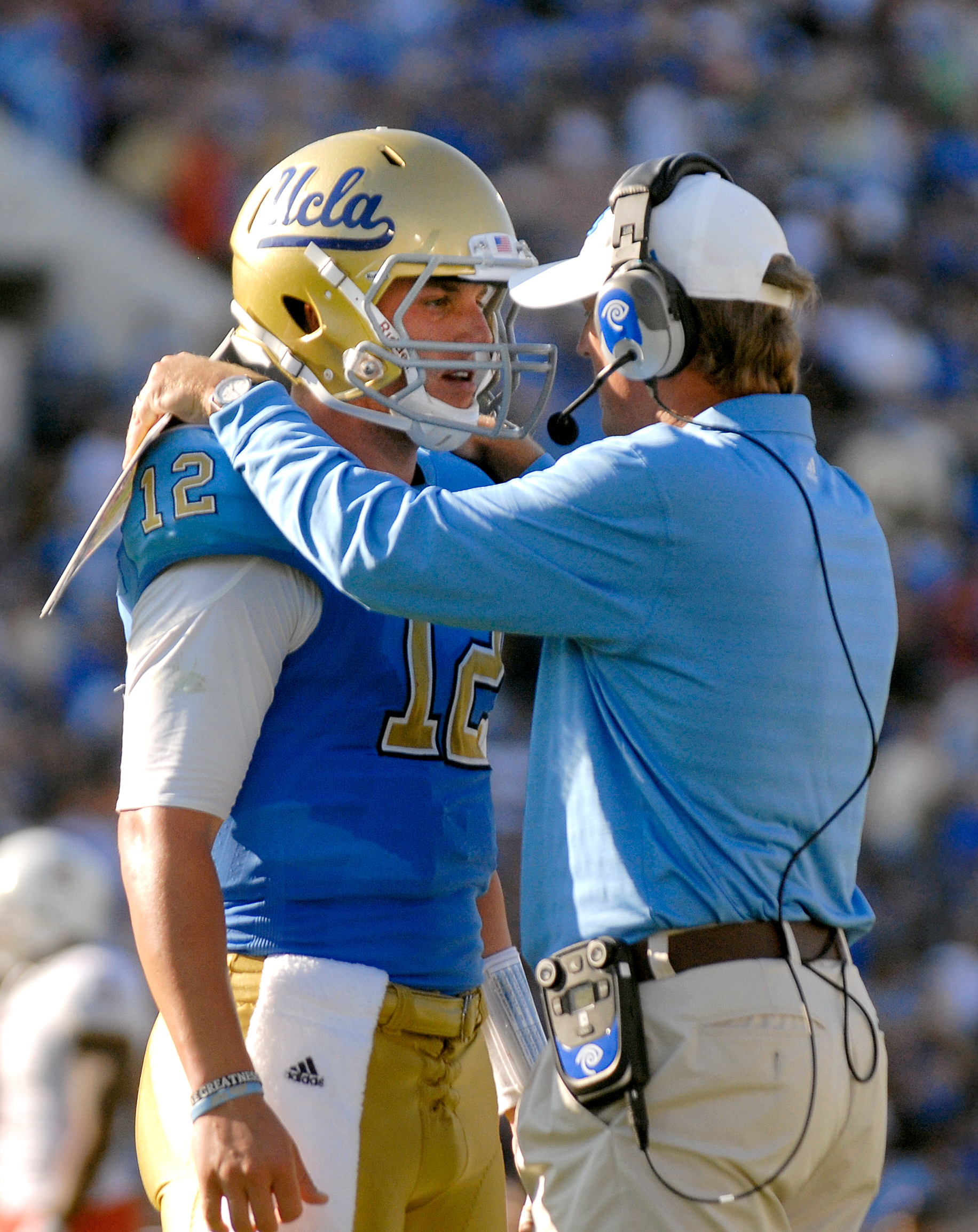The UCLA football team is in the middle of a crisis.
They’ve lost three games in a row, they are now 1-4 in the Pac-10 and they are inevitably cruising toward having a lower win total than last year, which coincidentally would leave them ineligible for a bowl game.
But that’s not the crisis I’m talking about.
I’m referring to the crisis that is happening on the field, game after game after game.
What is the identity of this UCLA football team?
Is it a defensive squad? Is it a passing team? Is it a smash-mouth, rushing team?
Not only am I clueless as to what image this team hopes to portray, but it also seems the Bruins are unaware of what they are, as well.
In Saturday’s loss to Arizona, the Bruins seemed to be a passing team. In fact, since Richard Brehaut began starting in place of Kevin Prince, it seems UCLA has looked to pass more.
Or is that just me?
“It’s a very difficult position to play, and you’d like to learn it as fast as possible, but sometimes it just takes reps,” coach Rick Neuheisel said of Brehaut’s quarterbacking after the game. “We’re going to keep coaching him and keep working with him and keep believing in him.”
So they are trying to get Brehaut more passing experience, is that what that means?
Looks like it …
Brehaut threw the ball 27 times Saturday, and the sophomore hasn’t attempted less than 23 passes in any of his three starts.
Prince averaged around 18, but that number was boosted after throwing 31 times in an attempt to pull off a comeback against Cal.
Of Brehaut’s 27 passing attempts Saturday, he connected on 13 of them for 228 yards. Two of the three touchdowns that the Bruins scored in the game were on long pass plays, one going for 68 yards and the other for 49 yards.
So the Bruins’ passing game did have some success.
But a few negatives come along with UCLA focusing on the passing game, one of which is the effect it has had on the previously successful running game.
So far in the season, winning the time-of-possession battle has equaled success for UCLA. In the Bruins’ three wins, they have won the time-of-possession battle. In their five losses (except for the loss against Oregon, who was just better), they’ve lost that battle.
With that said, going back to this weekend’s loss, the Bruins’ passing game isn’t efficient enough to win the time of possession battle. Arizona, who attempted 36 passes Saturday, was still able to control the game because 24 of those passes were completions.
Efficiency allowed Arizona to win the possession battle by more than 15 minutes.
“The effort was terrific,” Neuheisel said. “Unfortunately, the execution didn’t get it done at times. We’ve just got to get that better.”
See, even Rick agrees that execution is key.
The Wildcats’ efficient passing game gave them the opportunity to tally 52 rushing attempts as opposed to 28 for the Bruins. If you can complete passes, that opens up the running game and vice versa.
UCLA did not complete passes Saturday and they haven’t all season.
In conjunction with the importance of winning the time of possession battle, another negative that comes along with UCLA having a passing identity is that it forces what could be a dominant Bruin defense to be on the field for extended periods of time.
UCLA’s defense was on the field for nearly 40 minutes Saturday. Only allowing 29 points is actually a plus. You can’t expect much out of a defense that is on the field twice as long as the offense.
When the Bruins lost to Stanford 35-0, the UCLA defense was on the field for 37 minutes. Against Cal, in a 35-7 loss, 34 minutes were tallied by the Bruins’ D.
The more UCLA runs, the longer the offense stays on the field and the longer the defense can rest.
It’s a simple equation.
Lastly, possibly the biggest negative of being a passing team is that the quarterback is in possession of the ball for a longer amount of time.
And I don’t know if you’ve noticed, but that’s not Auburn quarterback Cam Newton taking snaps for the Bruins.
Brehaut and Prince, although agile, aren’t the most secure ball-handlers I’ve ever seen. And we saw that Saturday.
On the Bruins’ last drive, down by eight, Brehaut fumbled, Arizona recovered and any chance of the Bruins tying the game was dashed.
Brehaut also threw a first-quarter interception against the Wildcats Saturday that reminded me a lot of the first-quarter interception he threw against the Ducks last week, killing any early momentum that the Bruins hoped to build.
The bottom line is that if you’re going to lose, lose with your best. I understand that Brehaut getting reps is the only way he will get better, but at this point, it’s about winning games.
The Bruins had a chance to salvage their season Saturday and they lost with the most unproven aspect of their team.
Unacceptable.
With reports from Eli Smukler, Bruin Sports senior staff. E-mail Watson at [email protected].
